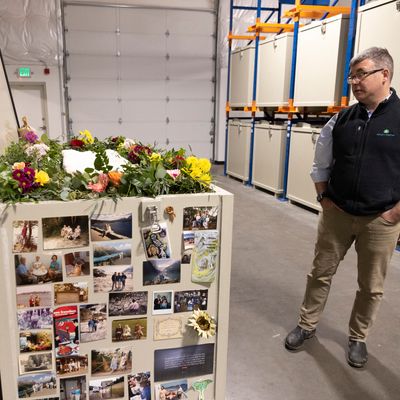
New York Governor Kathy Hochul on Saturday signed into law a bill legalizing the composting of human remains — one of a number of new so-called green burial methods that are gaining popularity as people look for ecologically conscious alternatives to cremation or traditional burial in a coffin. New York is now the sixth state to legalize human composting, also known as terramation or natural organic reduction, after death. Washington became the first state to legalize the practice in 2019.
To be clear, this does not mean people will be able toss their deceased loved ones into a backyard compost tumbler along with their discarded kitchen scraps and lawn trimmings. Human composting comprises placing someone’s body into a reusable vessel or pod along with biodegradable plant material like wood chips, straw, and alfalfa. While the vessel is stored at a special facility, microbes and beneficial bacteria break down the body over about a month, eventually producing a cubic yard of compost, or 27 cubic feet (a bag of potting soil is usually one cubic foot; one cubic yard of soil usually weighs about a ton). The compost can then be incorporated into outdoor land like a natural preserve cemetery, buried at a traditional cemetery, or — yes — used to amend, fertilize, or mulch a memorial garden.
As mortician Caitlin Doughty explained in a recent New York Times op-ed, human composting provides another option to lower the ecological impact of burial, producing less greenhouse-gas emissions than cremation and avoiding nonnatural burial practices such as embalming. “For a lot of folks being turned into soil that can be turned to grow into a garden or tree is pretty impactful,” Katrina Spade, who founded the Recompose green funeral home in Seattle, told the Associated Press. Catholic Church authorities in New York opposed the law. “Human bodies are not household waste, and we do not believe that the process meets the standard of reverent treatment of our earthly remains,” New York State Catholic Conference executive director Dennis Poust told the AP.
It’s not yet clear when willing New York funeral homes will be able to offer human composting to the public; a regulatory framework will need to be set up first.






























